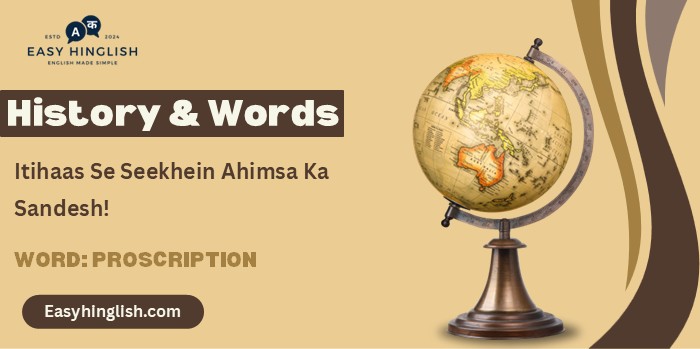History & Words: ‘Proscription’ (31 July)
Welcome to ‘History & Words’! 🌟 Main hoon Prashant, Wordpandit aur Learning Inc. Network ka founder. Yeh series language learning aur historical context ko connect karti hai, taaki vocabulary improve ho aur history ki understanding bhi deep ho.
Chaliye, shabdon ki iss journey par mere saath chaliye aur naye naye words explore karte hain! 😊
📚 Table of Contents
🔍 Word of the Day: Proscription
Pronunciation: /prəˈskrɪpʃən/ (pruh-SKRIP-shuhn)
Meaning: The act of forbidding or banning something, especially by law; also refers to the condemnation or outlawing of individuals, ideas, or expressions.
🌍 Parichay (Introduction)
31 July 1703 ko English novelist Daniel Defoe ko pillory me khada kiya gaya tha—ek humiliating punishment jo unko unke ek satirical pamphlet ke liye di gayi thi. Is pamphlet me unhone religious intolerance par harsh satire likha tha, jise government ne seditious libel maana. Ye incident early 18th-century England ke harsh proscription ko darshata hai—jahaan free speech par kanuni rok lagayi jaati thi.
“Proscription” ka matlab hota hai kisi activity, idea ya vyakti ko officially ban karna, khas kar political ya social reasons ki wajah se. Defoe ka punishment hume yaad dilata hai ki kabhi kabhi truth ya satire bolna bhi proscribed hota hai, aur uski keemat high hoti hai.
🌱 Shabd ka Utpatti (Etymology)
“Proscription” bana hai:
- Proscribere (Latin): “To publish in writing; to outlaw or forbid”
- Pro-: “Forward”
- Scribere: “To write”
Originally Roman context me, proscription ka matlab hota tha kisi vyakti ko outlaw declare karna, jise maarne tak ki ijazat hoti thi. Over time, yeh word legal and political bans ke liye use hone laga.
📖 Mahatvapurn Shabdavali (Key Vocabulary)
- 🔑 Proscription – Official or legal prohibition
- 🔑 Seditious Libel – Publication that incites rebellion against the state
- 🔑 Pillory – Wooden device used for public punishment and humiliation
- 🔑 Satire – Writing that uses irony or humor to criticize
- 🔑 Censorship – Suppression of speech, writing, or expression deemed objectionable
🏛️ Itihasik Sandarbh (Historical Context)
1703 me Daniel Defoe ne “The Shortest Way with the Dissenters” naam ka ek pamphlet publish kiya tha. Is satirical work me unhone religious nonconformists ke khilaaf strict measures ko exaggerate kiya, taaki Church of England ki bigotry expose ki ja sake.
Lekin authorities ne satire ko literally liya aur Defoe par seditious libel ka case banaya. Unhe arrest kiya gaya, fine lagaya gaya, aur 31 July ko London me public pillory me khada kiya gaya.
Ironically, unke punishment ke dauraan public ne unka support kiya—unpar flowers phenke gaye aur unki satirical poetry public me padhi gayi. Isne ek clear message diya: Proscription truth ko chhupaa nahi sakti.
⏳ Samayrekha (Timeline)
- 1701: Defoe publishes The True-Born Englishman, promoting tolerance
- 1703 (Spring): Writes “The Shortest Way with the Dissenters”
- 31 July 1703: Publicly punished in the pillory for seditious libel
- 1719: Publishes Robinson Crusoe, one of the first English novels
- 1720s: Becomes key voice in journalism and political commentary
- 1731: Daniel Defoe dies, remembered as a literary pioneer and free-thinker
🌟 Is Din ka Mahatva (The Day’s Significance)
- ✅ 31 July 1703 ek symbol ban gaya freedom of expression vs government control ke clash ka
- ✅ Proscription of Defoe’s satire ne question uthaya—kya sach bolna gunaah hai?
- ✅ Pillory punishment ke bawajood public ne Defoe ka samarthan kiya
- ✅ Yeh din hume batata hai ki jab governments truth ko criminalize karti hain, tab civil society ka response hi change laa sakta hai
💬 Prasiddh Ukti (Quote)
“Wherever truth is dangerous, liberty is already lost.”
— Inspired by Defoe’s writings(Matlab: Jahan sach bolna risky ho jaye, wahan azadi pehle hi kho chuki hoti hai.)
🔮 Aaj Ka Matlab aur Chintan (Modern Usage & Reflection)
“Proscription” ka upyog aaj bhi kai critical contexts me hota hai:
- ✅ Politics: “Proscription of opposition parties” – totalitarian regimes ka tool
- ✅ Media: “Proscription of press freedom” – censorship ke laws ke through
- ✅ Religion: “Proscription of faith practices” – historical persecution ka ek roop
- ✅ Law: “Proscription orders” – terrorism or banned organizations ke liye legal status
Yeh word hume warn karta hai ki ideas ka ban lagana aksar samaj ko backward le jaata hai, aur progress sirf open dialogue se hoti hai.
🏛️ Virast (Legacy)
- ✅ Daniel Defoe ne prove kiya ki satire aur dissent society ko jagane ke tools hote hain
- ✅ 1703 ka proscription ek early example hai free speech suppression ka
- ✅ Defoe ka kaam journalism, fiction aur political criticism ka foundation ban gaya
- ✅ Proscription ke against public response ne civil liberties ki disha tay ki
- ✅ Aaj bhi proscription word legal bans, ideological warfare aur social censorship ka hissa hai
🔍 Tulnatmak Vishleshan (Comparative Analysis)
“Proscription” ka comparison kuch aur terms se kiya ja sakta hai:
- Ban: Broader and informal; proscription is formal and legal
- Outlawing: Similar but more individual-focused
- Suppression: General force-based stifling of actions
- Censorship: Specific to speech; proscription is broader—covering people, beliefs, and groups
“Proscription” is sharper, legal, and historically loaded—a term used for institutionalised exclusion.
💡 Kya Aapko Pata Hai? (Did You Know?)
🎓 Antim Vichar (Conclusion)
“Proscription” ek shabd hai jo sirf ban ko nahi, power aur fear ke beech ka rishte ko define karta hai. 31 July 1703 ko jab Defoe ko pillory me khada kiya gaya, tab unki kalam aur public support ne dikha diya ki proscribed truth bhi kabhi-kabhi sabse loud awaaz ban jaata hai.
Yeh shabd aur yeh din hume yaad dilate hain ki freedom of speech ek luxury nahi, democracy ki backbone hai.
📚 Aage Padhne Ke Liye (Further Reading)
- 📖 The Life and Strange Surprising Adventures of Daniel Defoe – Richard West
- 📖 Satire and Dissent – Amber Day
- 📖 The Politics of Proscription in Ancient Rome – Michael C. Alexander
- 📖 Freedom of Speech: A History from the Ancient World to the Postmodern Era – David Coliver
- 📖 Defoe’s Politics: Parliament, Power, Kingship, and the Early Enlightenment – Manuel Schonhorn








